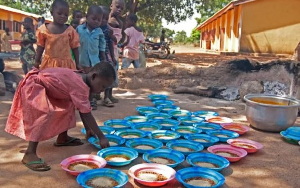A recent Auditor-General’s report has revealed alarming practices within the Ghana School Feeding Programme (GSFP), exposing that many caterers are using substandard food items to prepare meals for students.
This revelation raises serious concerns about the nutritional quality and safety of meals provided to schoolchildren across the country – amid continuous threats and demonstrations from dissatisfied caterers over delayed payments.
The School Feeding Programme was launched in 2005 to provide pupils daily access to meals with the aim of encouraging more children to attend school and increase enrolment.
By November 2015, the programme had been implemented in 4,881 schools with about 1.69 million pupils across the 216 districts in the country benefitting. The number of beneficiary pupils continued to increase, reaching four million during 2022 in over 12,000 public basic schools.
Also, the programme has provided employment to over 10,850 caterers and over 32,000 cooks since its implementation.
Why the audit
Following confirmation by the Ghana Interbank Payment and Settlement Systems (GhIPSS) in October 2018 of a GH¢2.5million overpayment to some caterers, the Auditor General’s report dated 20 June 2019 reveals that Metropolitan, Municipal and District Assemblies (MMDAs) could not account for GH¢899,617 from catering application form sales – including the loss of GH¢141,000 due to inflated enrolment figures and data manipulation in the Sekyere East district.
A performance audit on the Ghana School Feeding Programme was commissioned to assess its effectiveness in meal provision, caterer procurement, food supply, payment and monitoring, in accordance with the Audit Service Act, 2000 (Act 584).
The audit, covering the period from 2017 to 2022, found that food served by the cooks was insufficient to sustain pupils throughout the school day, and not all caterers used wholesome ingredients to prepare meals.
Regarding payment, the Auditor-General noted that wrongful payments were made to caterers who were not under contract for the Programme to the tune of GH¢274,235 and an outstanding GH¢831,776 realised from the sale of Caterer Application Forms was not accounted for.
“We found, during our interviews with 32 out of 40 caterers procured for the programme across the five regions, that they could not finance the purchase of food items from traders and farmers to sustain the provision of meals for pupils because government did not ensure payment to the caterers on time. For instance, the Programme owed NAFCO GH¢1,950,590 for the supply of food items. Consequently, NAFCO stopped supplying food items to the GSFP since 2020,” said the Auditor-General in the report dated September 2023.
The report further found that the programme had challenges with the validation of data before payments were made, while contents of monitoring reports from Zonal Coordinators were the same for different years.
General News of Tuesday, 25 June 2024
Source: thebftonline.com

















